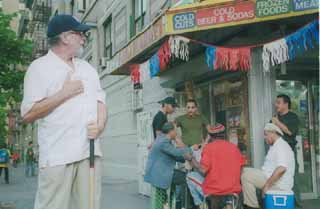WASHINGTON HEIGHTS
(director/writer: Alfredo de Villa; screenwriter: Nat Moss/Manny Perez; cinematographer: Claudio Chea; editor: Tom Donahue; music: Leigh Roberts; cast: Manny Perez (Carlos Ramirez), Tomas Milian (Eddie Ramirez), Danny Hoch (Mickey Kilpatrick), Jude Ciccolella (Sean Kilpatrick), Andrea Navedo (Maggie), Bobby Cannavale (Angel), David Zayas (David), Callie Thorne (Raquel), Judy Reyes (Daisy), Roberto Sanchez (Tito); Runtime: 85; MPAA Rating: R; producer: ; Mac Releasing; 2002-in English and Spanish, with English subtitles)
“A solid effort by the talented de Villa in his directorial debut.“
Reviewed by Dennis Schwartz
Mexican-born Alfredo de Villa sets his energetic human interest melodrama in the predominantly Dominican Washington Heights section of Manhattan, an area teeming with street-life, crime, subways that regularly rumble by, dominoes and stickball played on the street, and colorful characters. It’s based on an idea by Manny Perez, who also plays Carlos, and is co-scripted by Nat Moss and de Villa. It was shot on digital video with a limited budget. Its main strength is that it coherently takes you into an ethnic neighborhood seldom captured on film and convincingly delivers the tensions that boil over when dreamers clash with their violent surroundings and sons rebel against their old-guard fathers. There are many missteps, including overheated melodramatic moments that are needlessly tacked onto the main plot, too many subplots that are too sketchily drawn, too much dialogue that is not rewarding, and too many characters who take up time and space but add little to the story. Nevertheless, this is a solid effort by the talented de Villa in his directorial debut.
The gray bearded, rakish, Yankee hat wearing, widower, Eddie Ramirez (Tomas Milian), owns a popular bodega in Washington Heights, while his earring wearing 28-year-old son Carlos (Manny Perez) aspires to be a comic book artist for Gotham Comics and move with his live-in girlfriend Maggie (Andrea Navedo) to the East Village neighborhood where he works as an inker of comic books. But just when Carlos gets his big break to have his comic books published, his father gets shot in a store armed robbery and survives to only become a paraplegic. Carlos is now forced to care for his homebound father. A sub plot develops over the father receiving secretly a $25,000 loan from his Irish-American landlord, Sean Kilpatrick (Jude Ciccolella), as the stubborn father refuses to sell and pay back the loan but instead Carlos is forced to put his dreams on hold to run the grocery until his father can be well enough to return. Carlos’ best friend is Sean’s son Mickey (Danny Hoch), who works as the building super and aspires to be a professional bowler and wishes to enter a bowling tournament in Las Vegas to win a trophy. He thinks his dreams of winning bowling trophies can be fulfilled, if only he can talk his reluctant father into lending him the dough.
Things pick up in intensity just when things seem to be getting better for Carlos, as he gets a chance to do a comic for Gotham. The critique of his drawings that they are technically fine but have no soul finally register and through his recent bitter life experiences he is able to draw from that more realistic and earnest messages to support a more spiritually realized story. But trouble comes Carlos’s way when Mickey discovers in a tenant’s apartment a stash of $40,000 in an L.P.’s collection, and nicks $5,000 to pay his way to Vegas. The tenant is Angel, who is the local biker street thug brother of Maggie’s and a bad dude to mess with. Angel dreams of going back to the easy life in the Dominican Republic, but his way of doing it is making easy money as a drug dealer.
The simplistic lessons drawn are that the fathers don’t listen to their sons and are more pre-occupied with their business interests than with them. This fault comes to haunt them in a devasting way and makes them in the end see the error of their ways, though for one of them this wisdom comes too late.
My favorite scene was of an impatient lady peeing in the sink of a club, rather than waiting her turn in the ladies room. The film itself bustles with the restlessness of the younger generation to live for their dreams and make something for themselves. Their choices seem to be to work hard and do it the honest way or take the easy road and do it illegally. The film echoes the sentiments of the immigrant’s dream of America as a place where through hard work and help from friends one can achieve success, and it shows how difficult this road is paved for those living through the Latino experience.

REVIEWED ON 11/30/2003 GRADE: B-